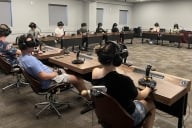You have /5 articles left.
Sign up for a free account or log in.
Massive open online courses, most would agree today, didn't change higher education in quite the ways that early advocates promised they would. Nor did they destroy higher education, as some feared.
Leonard J. Waks, professor emeritus of educational leadership at Temple University and president of the John Dewey Society, believes that there is much to learn from the rise of MOOCs -- once you move past the hype. He explores the hype and what he considers to be the real lessons in a new book, The Evolution and Evaluation of Massive Open Online Courses: MOOCs in Motion (Palgrave Macmillan).
He discussed the themes of his book in an email interview:
Q: You note that much of the hype about MOOCs was just hype. Did all of that hype damage public understanding of MOOCs or online education that was not provided through MOOCs?
A: There was plenty of hype on both sides, and no doubt the hype was detrimental to both public and professional understanding of MOOCs and online education.
On the Pro-MOOC front, statements by MOOC founders -- especially edX founder Anant Agarwal -- damaged the credibility of MOOC providers.Statements like “nothing has changed in education in 500 years” and “MOOCs are the most important change in education since Gutenberg’s printing press” offended anyone who had even a clue about the history of higher education. Since the 1870s we have experienced a shift from small church affiliated liberal arts colleges to mega-multiversity centers of research and development in technoscience and global commerce. Can anyone really believe that this shift is less significant than the addition of MOOCs?
On the anti-MOOC front, critics like Jonathan Rees of Colorado State University, Pueblo, who positioned himself as the debunker of the "MOOC Racket," argued that MOOCs were educationally worthless. He asked “How do you teach tens of thousands of people anything at once?” His answer: “You don't. What you can do over the Internet this way is deliver information, but that's not education.” These critics failed to consider how MOOCs might improve -- or take note of promising features of the best early entries. Rees in particular set out to ridicule MOOCs, and shame their founders. This does not add to understanding.
A lot of people lost interest in MOOCs because of the hype wars, and by 2013 many observers declared MOOCs dead. Meanwhile MOOCs continued to develop in unexpected ways -- largely under the radar.
Q: How did economic problems lead to the rise of MOOCs?
A: The great recession of 2008 did not lead directly to the rise of MOOCs. But it contributed to their instant appeal. Computers, the Internet, and Web 2.0 already transformed other institutions, from finance to medicine -- and even dating -- before the recession. Engineering-minded educational innovators were already exploring ways to scale up education. The recession just accelerated the process. It reduced state tax revenues. Incarceration rates and costs were skyrocketing because of mandatory sentencing laws and the growing power of the prison lobby. States reduced their higher education supplements. Students and their families had to make up for the shortfall with increased tuition. As one wit said, “you can force students to pay for college, but you can’t force criminals to pay for prison.”
Meanwhile, more employers were using the college diploma as a job filter -- even for jobs that did not require the kinds of knowledge and skill associated with a college diploma. More kids were forced into college. In the wake of the recession many good jobs were replaced by gigs -- temporary jobs without benefits. College students ended up paying more but getting less in return. Student debt became front page news.
Starting in 2011 -- just before the first MOOCs from Udacity, edX and Coursera -- aggregate college enrollments and tuition revenues dropped, for the first time ever.
So when the big MOOC platforms were rolled out in 2011 and 2012, the obvious pitch was that MOOCs would offer a free "world class" college education that would "level the playing field." This marketing fable -- not high-tech breakthroughs -- led The New York Times to declare 2012 "The Year of the MOOC."
Q: What have been the major educational benefits of MOOCs?
A: Many innovators saw the early MOOCs as prototypes that would gradually be improved. Keith Devlin, an early MOOC professor, said “There is no reason why a future MOOC should resemble anything we are currently familiar with,” while Armando Fox, another early adopter, added that “People are going to build stuff in a few years that is going to make today’s MOOCs look fairly pathetic.”Since then, some really beneficial MOOCs have come online -- a good example is Michael Lenox’s business strategy course, using crowdsourcing software to connect thousands of students to firms as consultants working on real-life challenges.
But the biggest benefit will not come from college course MOOCs, but from MOOC-like programs -- Udacity is the leader in this area -- providing students with focused occupational training and job placement without college matriculation. These programs will provide entry-level skills and real job opportunities in many fields for students from deindustrialized working class families - students who were driven into college solely for economic reasons when the industrial economy collapsed. Young people seeking to advance into leadership positions can then enroll in the university, and in many cases, employers will subsidize their tuition payments.
Q: What do you see as the major educational failings of MOOCs?
A: There were two major failings.
First, the MOOC founders ignored existing research on teaching and learning. Not surprisingly, many early MOOCs were terrible. But after the hype died down, MOOC leaders joined forces with educational researchers. So that problem has largely disappeared.
Second, MOOC founders over-estimated both the transfer value and occupational value of MOOC certificates. Agarwal reasoned that any college that would accept for transfer credit for a course in physics from an obscure community college would certainly accept an edX certificate in physics from MIT. This ignores the way credits work as currency in the educational system. Even obscure two-year colleges can tell their students that their credits will transfer; four-year colleges gain access to these students -- and their tuition dollars -- by accepting them. MOOCs are not part of this system. Colleges sell credits; they can’t stay in business if they start giving them away. Further, while the diploma filter is used, MOOC certificates that don’t convert into college credits are worthless as job credentials.But as MOOC-like programs like Udacity create programs leading to recognized credentials, this problem will also disappear.
Q: Many cutting-edge programs today (computer science at Georgia Tech, or the mixed MOOC-in-person master's programs at Masssachusetts Institute of Technology and elsewhere) use some MOOC ideas, but clearly are not strictly MOOCs. Is this where we'll see the lasting legacy of MOOCs?
A: Yes. Such programs appeal to employers. They are now emulated in developing nations with capital for investment but under-developed high educational infrastructures. I have already mentioned the Udacity nano-diplomas, offered outside traditional higher education.
Finally, we are seeing MOOC-like badge programs in traditional college programs. Georgetown opened a lot of eyes this September when it announced its badge program. In today’s gig economy employers no longer provide much training but demand job-ready skills for entry level positions. MOOC-like badge programs promise to provide these, even for graduates of prestigious universities like Georgetown that will eventually end up in leadership and draw on the capabilities obtained through a broad liberal education.








